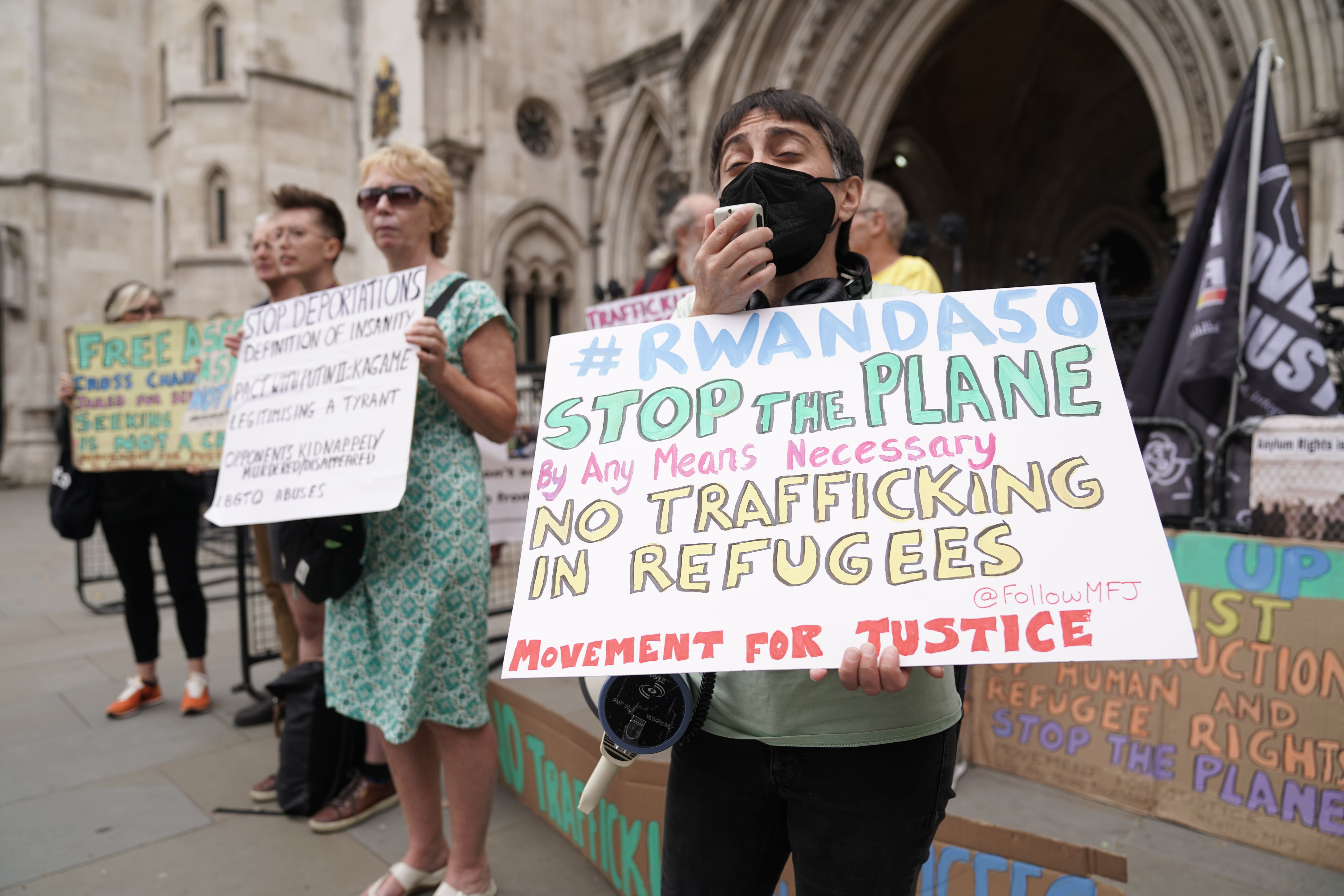Government’s Rwanda policy to deport asylum seekers is lawful, High Court rules
Judges quash decisions to remove eight asylum seekers who launched legal challenges but say policy overall is legal
The Rwanda policy is lawful but the government did not “properly consider the circumstances” of some asylum seekers selected for deportation, the High Court has ruled.
Lord Justice Lewis quashed the decisions to remove eight people who launched legal challenges against plans to send them to Kigali, and said they must be reconsidered by the home secretary.
But he added: “We have concluded that it is lawful for the government to make arrangements for relocating asylum seekers to Rwanda and for their asylum claims to be determined in Rwanda rather than the UK.”
The judge, who considered the case alongside Mr Justice Swift, said the policy announced by Priti Patel in April had been the “subject of considerable public debate”.
“The role of the court however is only to ensure that the law is properly understood and observed and that the rights guaranteed by parliament are respected,” he added.
Lord Justice Lewis said the evidence heard by the court showed that the British government had made arrangements with Rwanda to ensure asylum claims are “properly determined”, and that in those circumstances deportations would be consistent with the Refugee Convention, Human Rights Act and other legal obligations.
“However, the home secretary must consider properly the circumstances of each individual claimant,” he added, saying that had not been done in the eight individual cases considered.
Raza Husain QC, representing a group of claimants, indicated that they would consider appealing the ruling. Any applications for permission to appeal will be considered at a hearing on 16 January.
Suella Braverman has previously said she expected the High Court ruling to be appealed, possibly going to the Supreme Court, and that the government had to “let that play out”.
Following Monday’s judgment, the home secretary said: “We have always maintained that this policy is lawful and today the Court has upheld this.
“I am committed to making this partnership work – my focus remains on moving ahead with the policy as soon as possible and we stand ready to defend against any further legal challenge.”
The court previously heard that Rwanda was “ruled out” of consideration for an asylum deal by the Foreign Office, but put back on the list of potential countries after “particular interest” was shown by Boris Johnson and Priti Patel.
Documents filed by lawyers representing several people targeted for removal, the PCS union, Detention Action and Care4Calais showed that consideration of Rwanda for a “migration partnership” had started by September 2020.
Dominic Raab, then the foreign secretary, approved a set of criteria that stated countries would be excluded if “individuals faced a real risk of violations of international human rights law”.
Documents disclosed to the claimants by the government show that it appeared on a list of “14 countries assessed as presenting substantial issues in relation to asylum systems and human rights and/or political negotiability”.

A formal submission to Mr Raab said: “We’ve looked very carefully at Rwanda, which has previously agreed migration partnerships … but presents significant human rights concerns.”
It said Rwanda had been “accused of recruiting refugees to conduct operations in neighbouring countries”, had a “heavy handed security system” and that a previous deal with Israel had been suspended.
A submission to the former foreign secretary in April 2021 said: “No 10 have asked us to look again at the viability of [redacted] Rwanda [redacted]. We had previously ruled all these countries out on political and/or legal grounds. We see little reason to change that.”
The following month, a Foreign Office document said Downing Street had “continued to show interest” in Rwanda, but officials “continued to advise No 10 against engagement”.
But in June 2021, civil servants were told that the prime minister was “frustrated at the rate of progress” on an asylum processing deal with a foreign country, and that Mr Johnson shared a “particular interest in Rwanda” with Ms Patel and the immigration minister.
Mr Raab then authorised diplomatic staff in Rwanda to make contact with the country’s government on a potential deal, which was signed in April despite further internal government warnings over its treatment of refugees.
Written arguments on behalf of the home secretary said that claims were considered individually and there was “no risk of harm to any of the individual claimants in Rwanda”.
Lawyers acting for the Home Office said there had been a “dramatic increase” in small boat crossings over the English Channel and Ms Patel “considers that there is a strong public interest in deterring such illegal, dangerous and unnecessary journeys from safe third countries to the UK by asylum seekers”.
They added: “To achieve that aim, the UK looked to form a partnership with another third country to which asylum seekers, who have made such journeys to the UK, could safely be relocated.
“That third country had to be safe but without the same attractions to migrants as the UK appears to present. Several countries were considered but Rwanda was the first to be selected.”
The second judicial review, by representatives of the Asylum Aid charity said the procedure for selected migrants was “inherently unlawful and unfair”.
They argued that it was an “error of law” for the home secretary to treat an internal assessment that Rwanda was a safe country as equivalent to the previous EU scheme or a 2004 law that contained a list of nations - not including Rwanda - considered safe for asylum transfers.
The Home Office legal team argued that in law, the home secretary is “empowered to effect removal to any safe third country following a determination of inadmissibility”.
Join our commenting forum
Join thought-provoking conversations, follow other Independent readers and see their replies
Comments


Bookmark popover
Removed from bookmarks